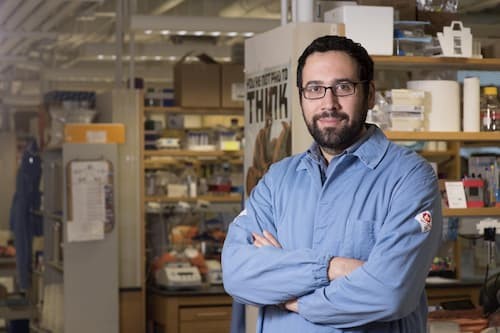Boston College Assistant Professor of Biology Emrah Altindis has received a three-year, $300,000-grant from the G. Harold and Leila Y. Mathers Foundation for research into childhood celiac disease.
Altindis and his team will explore the role of gut microbes and serum metabolites in the autoimmune disease, which is an immune reaction to eating gluten, a protein found in wheat, barley, and rye that result in damaging the small intestine.
“We are grateful for the very generous support of the Mathers Foundation and delighted to receive the foundation’s recognition for our work on pediatric autoimmune diseases,” said Altindis.
This is the second award the Altindis lab has received from the Mathers Foundation, which sponsors scientific research to advance knowledge in the life sciences, with potential translational applications. Last year, he received a $300,000 award to support his research into Type 1 diabetes, marking the first award to a BC researcher from the foundation.

Assistant Professor of Biology Emrah Altindis
The project, titled “The Role of Gut Microbes and Metabolites in Childhood Celiac Disease Pathogenesis," will explore the link between the gut microbes and metabolites and the onset of pediatric celiac disease.
“We are very excited to start our experimental work and feel privileged to have the support of the Foundation,” said Altindis. “I would like to thank our collaborators, Noah Palm, Michael Kiebish and Johhny Ludvigsson and their teams, my postdocs, and students. Without their support and hard work, this grant would not be possible.”
The Altindis lab recently completed the first longitudinal human gut microbiome and metabolome study analyzing pediatric celiac disease samples and comparing them to healthy matched controls.
“We showed that the composition of the gut microbiome and serum metabolome of the children who will eventually develop the disease are completely different and pro-inflammatory years before diagnosis when compared to healthy infants,” said Altindis, who also holds an adjunct appointment at Joslin Diabetes Center and Harvard Medical School. “This award will build upon our prior work and we will determine the underlying mechanisms of the pediatric celiac disease pathogenesis in the context of gut microbes and metabolome.”
Celiac disease is estimated to afflict 3 million Americans and tens of millions of individuals throughout the world. Yet there is little clear understanding of the environmental triggers of this chronic disease except for the role of gluten, said Altindis.
Similarly, there is no alternative treatment to a gluten-free diet, nor any way to prevent the disease, he added.
“Successful completion of the project will contribute an important missing element in our knowledge of the microbes and their role in celiac disease pathogenesis,” Altindis said. “These studies will constitute a new link between gut antigens and celiac diseases, with the potential to ultimately provide new tools including vaccines, antibiotics or probiotics for prevention and treatment of the disease.”
Ed Hayward | University Communications | November 2020




